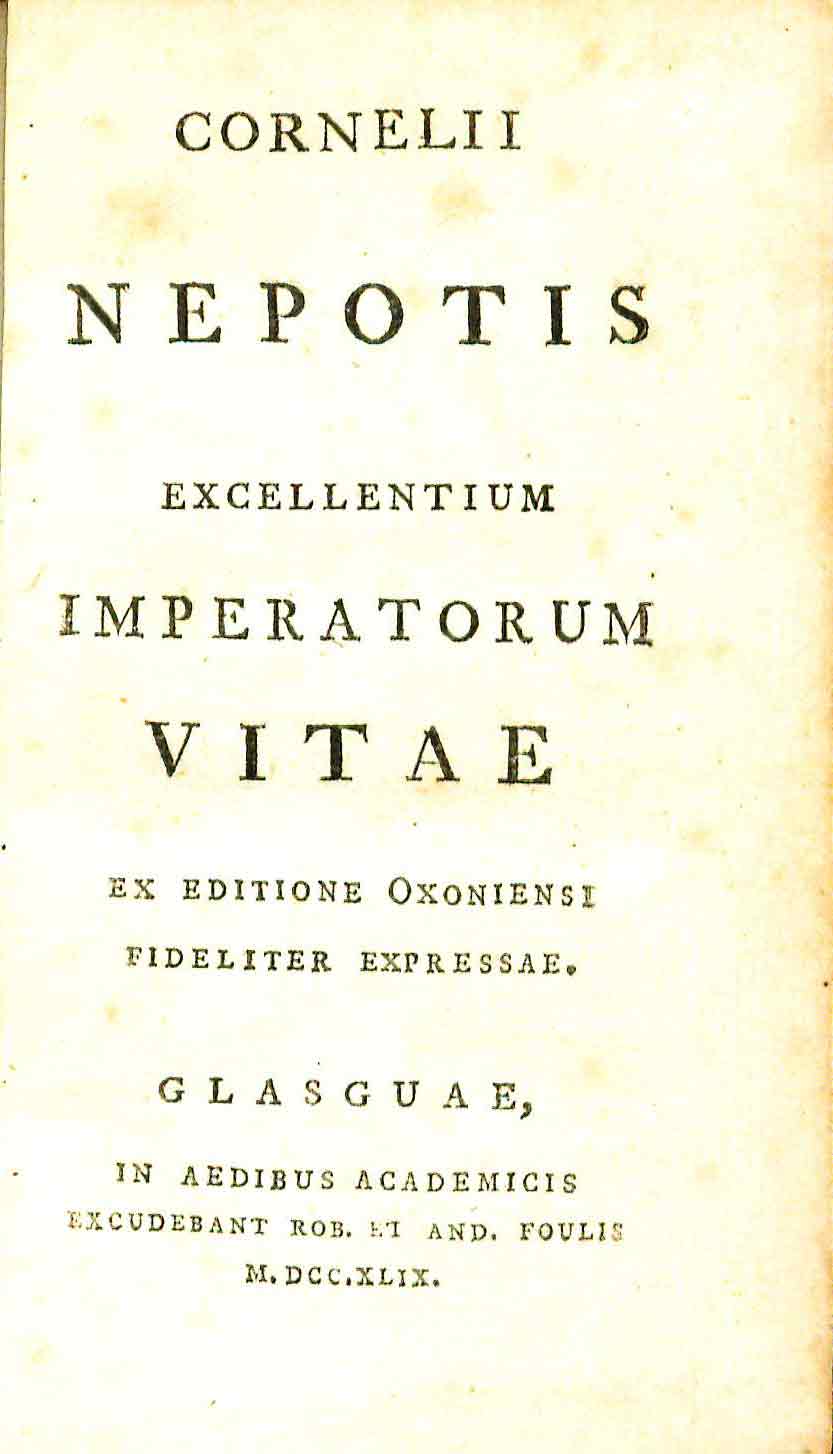Difference between revisions of "Cornelii Nepotis Excellentium Imperatorum Vitae et Editione Oxoniensi Fideliter Expressae"
(→by Cornelius Nepos) |
|||
| Line 2: | Line 2: | ||
===by Cornelius Nepos=== | ===by Cornelius Nepos=== | ||
__NOTOC__ | __NOTOC__ | ||
| − | |||
| − | |||
| − | |||
| − | |||
| − | |||
{{BookPageInfoBox | {{BookPageInfoBox | ||
|imagename=NeposCorneliiNepotisExcellentium1749.jpg | |imagename=NeposCorneliiNepotisExcellentium1749.jpg | ||
| Line 16: | Line 11: | ||
|publisher=In Aedibus Academicis excudebant Rob. et And. Foulis | |publisher=In Aedibus Academicis excudebant Rob. et And. Foulis | ||
|year=1749 | |year=1749 | ||
| − | }} | + | }}[http://en.wikipedia.org/wiki/Cornelius_Nepos Cornelius Nepos] (c. 110 – 24 BCE) is the earliest extant Latin biographer. He was born in Cisalpine Gaul, meaning he was on ''this'' side (the Roman side) of the Alps in Gaul. By 65 BCE, he had moved to Rome and established himself in the literary circles of the time. His work ''On Famous Men'' grouped and chronicled the lives of about 400 men, both Roman and non-Roman, who he recognized as significant and important men. From those biographies, today remains “On Eminent Foreign Generals” and the lives of Porcius Cato and Atticus from his section on Roman Historians.<ref>[http://www.oxfordreference.com/view/10.1093/acref/9780192801463.001.0001/acref-9780192801463-e-1497 "Nēpos, Cornēlius"] in ''Oxford Dictionary of the Classical World'', ed. by John Roberts (Oxford: Oxford University Press, 2007).</ref><br/> |
| + | <br/>In the latter half of the twentieth century, Nepos was largely discounted as a sub-par researcher and writer due to his basic linguistic structures and error-ridden historical accounts.<ref>Molly M. Pryzwansky, “Cornelius Nepos: Key Issues and Critical Approaches,” ''The Classical Journal'' 105, no 2 (Dec. 2009): 97.</ref> According to one historian, “the accidents of survival and Nepos’ [sic] primacy as the first extant Latin biographer are what make him worthy of study. The biographer’s methods, themes, philosophies and political views are secondary to his position on the generic timeline and are not inherently interesting in themselves.”<ref>Ibid, 98.</ref> However, in more recent years, ancient historians and biographers have been looked upon in a kinder light with an emphasis on the moral tone and purpose of the author: | ||
| + | <blockquote>A biography’s historicity, moreover, is often subordinated to its moral agenda. Thus, a biographer might deliberately employ a flexible chronology or prefer anecdotal evidence to harder, grander “facts” and deeds in order to underscore some of his subject’s traits, such as loyalty, generosity, restraint—or the lack thereof.<ref>Ibid, 100.</ref></blockquote> | ||
==Evidence for Inclusion in Wythe's Library== | ==Evidence for Inclusion in Wythe's Library== | ||
Revision as of 17:48, 19 February 2014
by Cornelius Nepos
| Cornelii Nepotis Excellentium Imperatorum Vitae et Editione Oxoniensi Fideliter Expressae | |
|
Title page from Cornelii Nepotis Excellentium Imperatorum Vitae et Editione Oxoniensi Fideliter Expressae, George Wythe Collection, Wolf Law Library, College of William & Mary. | |
| Author | Cornelius Nepos |
| Published | Galsguae: In Aedibus Academicis excudebant Rob. et And. Foulis |
| Date | 1749 |
| Language | Latin |
Cornelius Nepos (c. 110 – 24 BCE) is the earliest extant Latin biographer. He was born in Cisalpine Gaul, meaning he was on this side (the Roman side) of the Alps in Gaul. By 65 BCE, he had moved to Rome and established himself in the literary circles of the time. His work On Famous Men grouped and chronicled the lives of about 400 men, both Roman and non-Roman, who he recognized as significant and important men. From those biographies, today remains “On Eminent Foreign Generals” and the lives of Porcius Cato and Atticus from his section on Roman Historians.[1]
In the latter half of the twentieth century, Nepos was largely discounted as a sub-par researcher and writer due to his basic linguistic structures and error-ridden historical accounts.[2] According to one historian, “the accidents of survival and Nepos’ [sic] primacy as the first extant Latin biographer are what make him worthy of study. The biographer’s methods, themes, philosophies and political views are secondary to his position on the generic timeline and are not inherently interesting in themselves.”[3] However, in more recent years, ancient historians and biographers have been looked upon in a kinder light with an emphasis on the moral tone and purpose of the author:
A biography’s historicity, moreover, is often subordinated to its moral agenda. Thus, a biographer might deliberately employ a flexible chronology or prefer anecdotal evidence to harder, grander “facts” and deeds in order to underscore some of his subject’s traits, such as loyalty, generosity, restraint—or the lack thereof.[4]
Evidence for Inclusion in Wythe's Library
Listed in the Jefferson Inventory of Wythe's Library as Cornelius Nepos. 12mo. Foul. and given by Thomas Jefferson to his grandson Thomas Jefferson Randolph. The precise edition owned by Wythe is unknown. George Wythe's Library[5] on LibraryThing indicates this, adding "Duodecimo editions were published by Foulis in 1742 and 1749." The Brown Bibliography[6] lists the 1742 edition based on the copy Jefferson sold to the Library of Congress.[7] The Wolf Law Library found a copy of the 1749 Foulis edition and purchased it.
Description of the Wolf Law Library's copy
Bound in full brown calf with gilt border to front and rear boards and gilt to spine. Purchased from Schooner Books, Ltd.
View this book in William & Mary's online catalog.
References
- ↑ "Nēpos, Cornēlius" in Oxford Dictionary of the Classical World, ed. by John Roberts (Oxford: Oxford University Press, 2007).
- ↑ Molly M. Pryzwansky, “Cornelius Nepos: Key Issues and Critical Approaches,” The Classical Journal 105, no 2 (Dec. 2009): 97.
- ↑ Ibid, 98.
- ↑ Ibid, 100.
- ↑ LibraryThing, s. v. "Member: George Wythe," accessed on November 13, 2013, http://www.librarything.com/profile/GeorgeWythe
- ↑ Bennie Brown, "The Library of George Wythe of Williamsburg and Richmond," (unpublished manuscript, May, 2012) Microsoft Word file. Earlier edition available at: https://digitalarchive.wm.edu/handle/10288/13433
- ↑ E. Millicent Sowerby, Catalogue of the Library of Thomas Jefferson, 2nd ed. (Charlottesville: University Press of Virginia, 1983), 1:33-34 [no.71].
